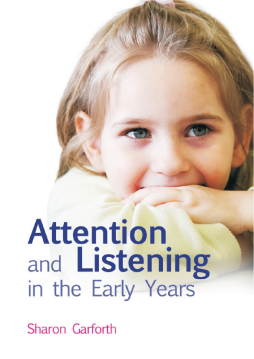
Additional Information
Book Details
Abstract
The ability to attend, to listen and to look are prerequisites to all forms of learning. By facilitating children's attention and listening skills, we are able to give them a better chance of achieving their potential in communication, speech and language, and therefore learning skills.
Attention and Listening in the Early Years is an innovative course designed for groups of children aged 2-4. Each group session is planned around a theme such as 'The Farm' or 'The Zoo'. The themes provide an anchor for the children to gain meaning from the listening activities, games and songs that will help them learn to sit still, not talk, look at the speaker and think about the words - all vital skills in good listening. Complete with full instructions, including lists of the equipment needed for each session and the auditory and visual objectives of each activity, the book also includes photocopiable detailed preparation plans and shorter prompt plans for use during the sessions.
Each session should run for no longer than 15 to 25 minutes, and will be a fun and fruitful alternative to traditional circle-time for early years practitioners such as playgroup and preschool leaders, and speech and language therapists.
This is a clearly presented and useful resource book...There are lots of useful activities using songs, rhymes, physical activity and musical instruments. I was inspired to try out some of the activities in a small language group held in a clinic setting for three year old children, and found them very successful!
NAPLIC Newsletter
The curriculum in Attention and learning in the early years will certainly engage children's attention through activities utilising varied intelligences, sensory stimulation, and movement.
International Journal of Children's Spirituality
Sharon Garforth has over 20 years' experience as a speech and language therapist, and is a member of the Royal College of Speech and Language Therapists and the Health Professions Alliance.
Table of Contents
| Section Title | Page | Action | Price |
|---|---|---|---|
| List of figures and tables | |||
| SEADS: Minimum Standards for Supporting Crop-related Livelihoods in Emergencies | |||
| Chapter 1: How to Use this Handbook | |||
| Chapter 2: The Scope and Approach of SEADS | |||
| Chapter 3: SEADS Principles | |||
| Chapter 4: Initial Assessment for Crop-related Crisis Response | |||
| Chapter 5: Seed and Seed Systems | |||
| Chapter 6: Tools, Equipment, and Other Non-seed Inputs | |||
| Chapter 7: Crop-related Infrastructure | |||
| Chapter 8: Impact-oriented Monitoring and Evaluation | |||
| Annex A: Glossary | |||
| Annex B: References | |||
| Annex C: Elements of Team Competency | |||
| Annex D: Acknowledgments and Contributors | |||
| Annex E: Index |
